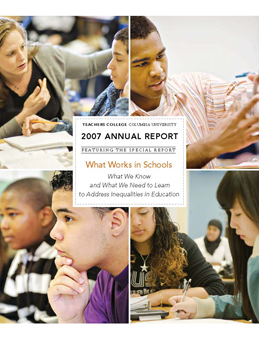What Works in Schools
What we know and what we need to learn to address inequalities in education
At a conference in
“You guys give all this space to the so-called academic experts, and none to teachers, who really know what’s going on in schools,” he said. “And the feeling among a lot of us is”—he dropped into the voice of one of the banditos in “The Treasure of Sierra Madre”—“‘We don’t need no stinking researchers to tell us that kids learn better in smaller classes.’”
The panelists looked at one other. Andy Rotherham, creator of the blog “EduWonk,” took the microphone. “Actually, the literature is pretty clear. Class size by itself doesn’t boost student outcomes. Smaller classes aren’t as powerful as teacher effectiveness.”
Not every researcher would agree with
That’s the rationale for Teachers College’s Equity Matters research initiative, launched in 2007 by the College’s Campaign for Educational Equity. Fourteen TC faculty members and their students, as well as researchers at other institutions, are inventorying the successes and failures of strategies across a range of fields that affect the nation’s education achievement gap. The topics include pre-k education, special education, school leadership development, bilingual education, teacher quality, class size, challenging curriculum, after-school programs, parental involvement, families as the focus for school interventions, children’s health, and segregation and the concentration of poverty.
“Our belief is that because inequities in schools stem from broader inequities in society, we can’t fix them without understanding and addressing all the causes,” says Michael Rebell, the Campaign’s Executive Director.
“In recent times, responsibility for high and low test scores has been laid almost entirely at the schoolhouse door,” says Amy Stuart Wells, Professor of Sociology and Education at Teachers College and Director of the Campaign’s research initiative. “Through these multi-disciplinary research reviews, we hope to provide more thorough explanations for school failure and success.”
Ultimately, the power of the Equity Matters reviews is cumulative. Separately, each sheds valuable new light on a distinct issue in education. Together, the reviews turn a set of klieg lights on the much broader problem of inequity in
The following special report offers an early peek at the findings of the Campaign’s research initiative. It’s a sobering, sometimes startling look both at past reform efforts and our nation’s future. But we think you’ll agree that it makes one thing abundantly clear: equity does indeed matter.
To view completed Equity Matters reviews, visit www.tcequity.org
Published Tuesday, May. 20, 2008
